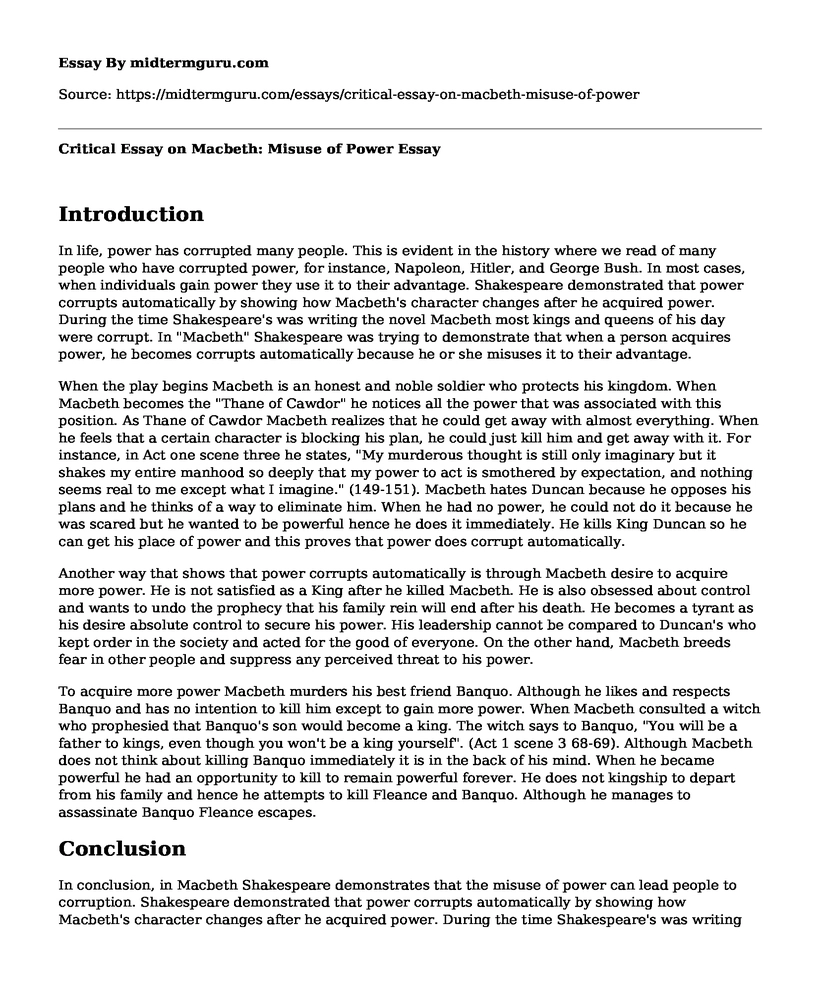Introduction
In life, power has corrupted many people. This is evident in the history where we read of many people who have corrupted power, for instance, Napoleon, Hitler, and George Bush. In most cases, when individuals gain power they use it to their advantage. Shakespeare demonstrated that power corrupts automatically by showing how Macbeth's character changes after he acquired power. During the time Shakespeare's was writing the novel Macbeth most kings and queens of his day were corrupt. In "Macbeth" Shakespeare was trying to demonstrate that when a person acquires power, he becomes corrupts automatically because he or she misuses it to their advantage.
When the play begins Macbeth is an honest and noble soldier who protects his kingdom. When Macbeth becomes the "Thane of Cawdor" he notices all the power that was associated with this position. As Thane of Cawdor Macbeth realizes that he could get away with almost everything. When he feels that a certain character is blocking his plan, he could just kill him and get away with it. For instance, in Act one scene three he states, "My murderous thought is still only imaginary but it shakes my entire manhood so deeply that my power to act is smothered by expectation, and nothing seems real to me except what I imagine." (149-151). Macbeth hates Duncan because he opposes his plans and he thinks of a way to eliminate him. When he had no power, he could not do it because he was scared but he wanted to be powerful hence he does it immediately. He kills King Duncan so he can get his place of power and this proves that power does corrupt automatically.
Another way that shows that power corrupts automatically is through Macbeth desire to acquire more power. He is not satisfied as a King after he killed Macbeth. He is also obsessed about control and wants to undo the prophecy that his family rein will end after his death. He becomes a tyrant as his desire absolute control to secure his power. His leadership cannot be compared to Duncan's who kept order in the society and acted for the good of everyone. On the other hand, Macbeth breeds fear in other people and suppress any perceived threat to his power.
To acquire more power Macbeth murders his best friend Banquo. Although he likes and respects Banquo and has no intention to kill him except to gain more power. When Macbeth consulted a witch who prophesied that Banquo's son would become a king. The witch says to Banquo, "You will be a father to kings, even though you won't be a king yourself". (Act 1 scene 3 68-69). Although Macbeth does not think about killing Banquo immediately it is in the back of his mind. When he became powerful he had an opportunity to kill to remain powerful forever. He does not kingship to depart from his family and hence he attempts to kill Fleance and Banquo. Although he manages to assassinate Banquo Fleance escapes.
Conclusion
In conclusion, in Macbeth Shakespeare demonstrates that the misuse of power can lead people to corruption. Shakespeare demonstrated that power corrupts automatically by showing how Macbeth's character changes after he acquired power. During the time Shakespeare's was writing the novel Macbeth most kings and queens of his day were corrupt. When people are in positions of power they tend to abuse it and hurt others to get what they want.
Work Cited
Wills, Garry. Witches and Jesuits: Shakespeare's Macbeth. Oxford University Press on Demand, 1996.
Cite this page
Critical Essay on Macbeth: Misuse of Power. (2022, Sep 11). Retrieved from https://midtermguru.com/essays/critical-essay-on-macbeth-misuse-of-power
If you are the original author of this essay and no longer wish to have it published on the midtermguru.com website, please click below to request its removal:
- Essay on Time Stands Still By Donald Marguiles
- Literal analysis of Whitman's Poem Song of Myself - Paper Example
- A Research Paper Example on Scott Fitzgerald's Babylon Revisited
- Essay on The Freedom Writers
- Literary Analysis Essay on Twelfth Night by William Shakespeare
- Utopia Unreachable: The Consequences of Perfect Societies - Essay Sample
- Literary Analysis Essay on 'Theme for English B' by Langston Hughes







